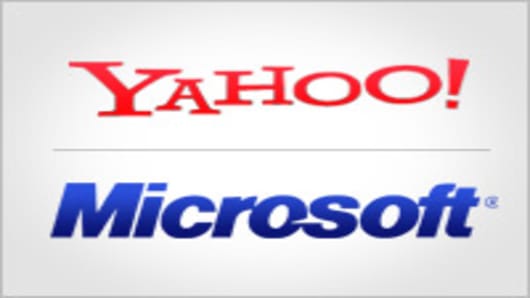Ladies and gentlemen, we have a deal.
After three years of pursuit and rhetoric, one of the most Quixotic partnerships in the history of the tech business was finally consummated over night.
Yahoo and Microsofthave finally gotten together.
And the stock prices in each should tell you all you need to know about how investors think of the relationship.
A resounding thud.
As I read through the agreement this morning, and poured through the colorful rhetoric and hopes and dreams of the two sides, I couldn't help but think back through a little history. No, not the $47 billion original offer Microsoft made for Yahoo that the company would squander in one of the most historic dereliction's of fiduciary responsibility American business has ever seen.
Actually, I'm talking about far more recent history where Yahoo CEO Carol Bartz said she was all ears for some kind of deal as long as it included "boatloads" of cash. Instead, Yahoo shareholders get a dingy full. No cash upfront. And that's a stunner.
Bartz on the conference call this morning addressed that very point, by again employing her "boatloads" language. Not "boatloads" of cash, but "boatloads" of "value." Ugh.
"Having a big cash payment upfront, doesn't really help us from an operating standpoint. What was most important to us was a significant TAC (traffic acquisition cost) rate," said Bartz.
Which Yahoo got up to 88 percent.
Look, I don't argue the merits of the partnership. Bartz said this morning the deal is all about scale. But for Yahoo, it also needs to be a lot about cash and it amazes me that in exchange for turning Microsoft's Bing into Yahoo's new Search engine, Yahoo couldn't squeeze cash -- real, bird in the hand cash, from Microsoft's coffers.
The complicated transaction masks some deep and uncomfortable truths. First, that even a combined Microsoft/Yahoo approach to Search will control only 28 percent of the market. Google, the company both are fumbling around to go after, still owns 65 percent. Second, today's partnership is still subject to regulatory approval and the companies admit that be another six months, all the while Google won't be sitting still. And unlike the last six months, or year, or three, Google won't be out there guessing what Yahoo and Microsoft are working on, because it now has the road map, like the rest of us, to go off of. And third, after all this time, looking over the announcement, I don't truly see what took both sides so long to come up with this agreement. This should have been done years ago, and it continues to be an embarrassment that it wasn't, and this is the deal that was ultimately decided upon, sans upfront cash.
In a perfect world, Yahoo gets $500 million in operating income, $200 million in capex savings, and operating cash flow increases by $275 million. Eventually. And even then, it could be a year or two before those numbers actually meander their way onto Yahoo's P&L.
All this sounds interesting, but in the end, Yahoo and Microsoft face boatloads of complexity and boatloads of competition. Microsoft gets to keep its cash and Yahoo gets to roll the dice on a very uncertain future. It's a kiss-your-sister kind of deal, and stock trading in both companies reflect it. It's been a long wait. And after all this time, shareholders will still be forced to wait -- a lot longer -- to see if the deal was worth waiting for.
It'll take years. And Google has to be loving this.
Questions? Comments? TechCheck@cnbc.com


